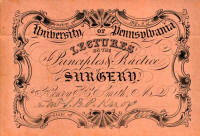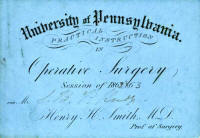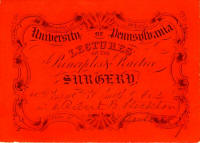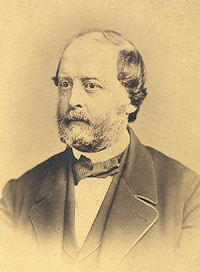Henry H. Smith, M.D.



Click image to enlarge
Go to lecture card display
|
Name: Henry H. Smith
A.B. 1834, A.M. 1837, M.D. 1837
Assistant in Demonstrative Surgery,
1849-1855
Professor of Surgery, 1855-1871
Emeritus Professor of Surgery, 1871-1890
Renowned Surgeon
Surgeon General of Pennsylvania
Cause of death: pneumonia
Death date: Apr 11, 1890
Place of death: Philadelphia, PA
Birth date: Dec 10, 1815
Place of birth: Philadelphia, PA
Type of practice: Allopath
States and years of licenses:PA, 1881
Medical school(s): University of Pennsylvania School of
Medicine, Philadelphia, 1837, (G)
Other education: Univ. of Pennsylvania, 1834
Journal of the American Medical Association
|
Penn Biographies
Henry Hollingsworth Smith (1815-1890)
 Henry Hollingsworth Smith was born in Philadelphia
on December 10, 1815, to James S. Smith and Lydia Leaming. Following in
his father's footsteps, the younger Smith enrolled in the University of
Pennsylvania in 1830 as a member of the Class of 1834. Four years later
he earned the degree of Bachelor of Arts (A.B.). During his
undergraduate years, Smith was a member of the Philomathean Society.
Following graduation from the College, Smith enrolled in the Medical
School where he earned the degree of Doctor of Medicine (M.D.) with the
Class of 1837. Henry Hollingsworth Smith was born in Philadelphia
on December 10, 1815, to James S. Smith and Lydia Leaming. Following in
his father's footsteps, the younger Smith enrolled in the University of
Pennsylvania in 1830 as a member of the Class of 1834. Four years later
he earned the degree of Bachelor of Arts (A.B.). During his
undergraduate years, Smith was a member of the Philomathean Society.
Following graduation from the College, Smith enrolled in the Medical
School where he earned the degree of Doctor of Medicine (M.D.) with the
Class of 1837.
After commencement from the
Medical School, Smith traveled to Europe where he continued his medical
studies in London, Vienna, and Paris. Upon returning to the United
States, Smith served as a resident physician at Pennsylvania Hospital.
During his medical career Smith
was on the staff of numerous Philadelphia Hospitals, including St.
Joseph's Hospital, Philadelphia Episcopal Hospital, Pennsylvania
Hospital, and Blockley Hospital. He also returned to his alma mater,
first as an assistant in Demonstrative Surgery in 1849 and, six years
later, as a Professor of Surgery - a position he held until 1871 when he
was named Emeritus Professor of Surgery.
During the Civil War, Smith served
under another former Pennsylvania student, General George McClellan.
Smith was charged with setting up and organizing Union Army hospitals
and was also named Surgeon General of Pennsylvania, a position he held
in 1861 and 1862.
During his distinguished career,
Smith wrote a number of books and journal articles on the practice of
medicine. He was a fellow in the American College of Physicians, the
President of the Philadelphia and Pennsylvania Medical Societies, the
Chair of the Surgical Section of the American Medical Association, and
the Chair of the Executive Committee of the International Medical
Congress. He also received the honorary degree of Doctor of Laws (LL.D.)
from Lafayette College in 1885.
He was married to Mary Edmonds,
the daughter of William Edmonds Horner, a Professor of Medicine at the
Medical School of the University of Pennsylvania.
Henry Hollingsworth Smith died in
Philadelphia on April 11, 1890.
SMITH, Henry Hollingsworth, surgeon, born in
Philadelphia, Pennsylvania, 10 December, 1815. He was graduated at the
University of Pennsylvania in 1837, and at the medical department in
1839, spent the subsequent eighteen months in study abroad, and on his
return settled in practice in Philadelphia. He became a surgeon to St.
Joseph's hospital in 1849, surgeon to the Episcopal hospital soon
afterward, one of the surgical staff to Blockley hospital in 1854, and
was professor of surgery in the medical department of the University of
Pennsylvania from 1855 till 1871, when he became professor emeritus.
At
the beginning of the civil war he was appointed to organize the hospital
department of Pennsylvania, and at the same time made surgeon-general of
Pennsylvania. In this capacity he contributed much to the efficiency of
the medical services of the Pennsylvania reserves and other state
regiments. At the first battle at Winchester, Virginia, he originated
the plan of removing the wounded from the battle-field to large
hospitals in Reading, Philadelphia, Harrisburg, and other cities, and
established the custom of embalming the dead on the battle-ground. He
organized and directed a corps of surgeons, with steamers as floating
hospitals, at the siege of Yorktown, and served the wounded after the
battles of Williamsburg, West Point, Fair Oaks, and Cold Harbor. After
thoroughly organizing the department of which he was in charge, he
resigned his commission in 1862, and has since been actively engaged in
the practice of his profession.
Dr. Smith is widely known as a medical
author. His publications include " An Anatomical Atlas," to illustrate
William E. Horner's" Special Anatomy" (Philadelphia, 1843); " Minor
Surgery" (1846) ; "System of Operative Surgery," with a biographical
index to the writings and operations of American surgeons for 234 years
(2 vols., 1852) ; " The Treatment of Disunited Fractures by Means of
Artificial Limbs" (1855); "Professional Visit to London and Paris"
(1855); "Practice of Surgery" (2 vols., 1857-'63) ; and numerous
surgical articles in medical journals; and he has translated from the
French Civiale's "Treatise on the Medical and Prophylactic Treatment of
Stone mid Gravel" (Philadelphia, 1841), and edited the "United States
Dissector" (1844), and Spenser Thompson's " Domestic Medicine and
Surgery" (1853).
Edited Appletons Encyclopedia, Copyright © 2001 VirtualologyTM
|
|